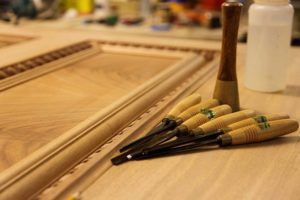The Irony of Craftsmanship
Tools and technology are improving at a rapid pace, and yet our skills as craftsmen have diminished.
This is the irony of craft: the more that tools and technology do for us, the less we can do for ourselves. A framer's nail gun makes him forget how to swing his hammer. His skill with a hand-saw has been replaced by the accuracy and speed of his power chop saw.

The "irony of craftsmanship" strikes in my mind like a chisel on stone, as I prepare a speech for the Texas Historical Society's annual conference in Austin this month. The conference organizers have asked me to talk about the future of craftsmanship. This assignment made me reflect back on my time at the North Bennet Street School of Preservation Carpentry where we studied 250 year old, traditional building methods.
Back then, we used hand tools to craft the parts and pieces of a new house. We learned timber framing, hand made sash and door building, and how to plane moldings. We sharpened our tools by hand. What we learned was in stark contrast to the mechanized building methods of today. The lost art of craft started in the 19th century with the Industrial Revolution, which begot a counter revolution: the Arts and Crafts movement. John Ruskin, William Morris and Gustav Stickley, leaders of this movement, rebelled against the machine. They were advocates of craftsmanship, of things made with the heart and the hand. The Arts and Crafts movement lasted well into the 20th century. And now, again, in this 21st century, we see a similar movement back to craftsmanship.
People long for things well made.
Separated from reality by all things virtual, once again we see value in human, tactile, creative expression. The fast food craze gives way to the slow food movement. Cardboard, disposable Mcmansions make us yearn for a house well-built, one that is handed down through generations. Instant coffee makes fresh brewed taste even better. The craft beer phenomenon demonstrates our desire for things well made by people not machines. A new generation is hungry for good things. There is opportunity for those skilled in craft. There is a growing consumer market for quality craftsmanship. There is an ancient proverb: "Do you see a man skilled in his work? He will serve before kings."
Let's get to work.

